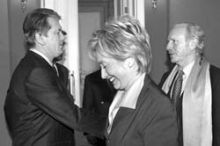On February 11 a high-level delegation of US Congress members paid a one-day visit to Ukraine. Among the visitors were such key figures as Senators John McCain and Hillary Clinton. Sen. McCain is a well-known and influential figure in US politics: a Vietnam War veteran, he ran unsuccessfully for the presidency in 2000 (George Bush Jr. was nominated and then elected president). Last year the senator was at the center of a debate over whom he would back in the last US presidential elections – George W. Bush or John Kerry; he opted for Bush. The great popularity of Mrs. Clinton, the former first lady, who is a likely Democratic candidate for the presidency as well as a senator highly esteemed by the electorate, is undeniable. In 2003 she successfully tried out her writer’s skills by publishing a best-selling memoir called Living History. Mrs. Clinton instantly became a model public figure, a wise and courageous woman who can keep a stiff upper lip in the most difficult minutes. (Anyone will come to this unambiguous conclusion after reading about the ex-first lady’s feelings about the Monica Lewinsky scandal.) This is Mrs. Clinton’s third visit to Ukraine. “This is the happiest visit I have ever had,” she told journalists last Friday. “I have seen the result of the people’s struggle for democracy and Ukraine: they have won.” She wished the Ukrainian people and the new leadership every success in achieving high social standards. “The US will be your partner in achieving this goal,” she emphasized.
The US senators held top-level discussions with the President Yushchenko, the prime minister, and the parliamentary speaker. Following these talks, the American visitors stressed that the US Congress will soon begin a debate on repealing the Jackson-Vanik Amendment with respect to Ukraine (a Cold War-era legislative amendment linking U.S. trade benefits to the emigration and human rights policies of Communist or formerly Communist countries). According to Sen. McCain, the Kyiv talks focused on economic aid to Ukraine, reducing the consequences of the Chornobyl disaster, and supporting Kyiv’s bid for membership in the WTO, the EU, and other international organizations. In particular, the negotiating parties broached the subject of NATO accession. President Yushchenko noted that the Ukrainian people need a proper explanation about NATO’s activities. He stressed that Ukraine is doing a lot to develop relations with the alliance, but ordinary people are poorly informed about the purpose and functions of this organization. During the talks the head of state expressed a hope that other countries would understand and support Ukraine’s Euro-Atlantic aspirations. This was President Yushchenko’s first more or less clear statement about NATO. Earlier, he avoided the subject, preferring to discuss EU matters. The president will be meeting with the NATO leadership on February 22 in Brussels, which has long been waiting for Mr. Yushchenko’s proposals about the NATO’s future relations with Ukraine. Last Friday Deputy-Prime Minister for European Integration Oleh Rybachuk announced that President Yushchenko will visit the US in early April. It looks like US-Ukraine relations are heading for a genuine thaw.







